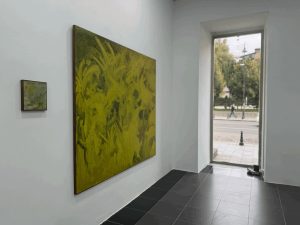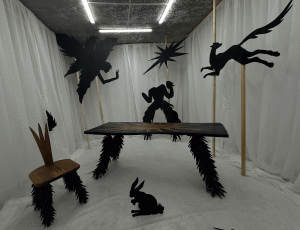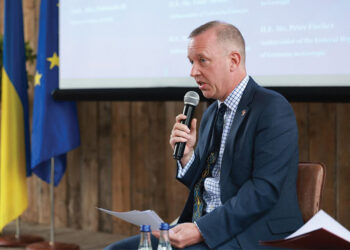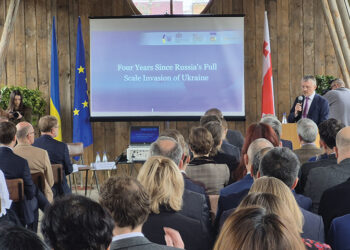In the heart of Tbilisi’s evolving art scene, The Why Not Gallery has curated two exhibitions that probe the depths of time, memory, and environmental consciousness with strikingly different yet equally compelling approaches. Erekle Chinchilakashvili and Sopo Mamaladze’s Slow Sun and the artist collective Garbage Kids’ Fictionfunctionfiction present visitors with a dual journey—a contemplation of personal and collective histories, and a bold critique of modern overconsumption. These exhibitions delve into both the internal landscapes of human experience and the external consequences of our current socio-environmental reality, all while embracing a poetic, visually arresting aesthetic.
Time’s Quiet Solitude
Erekle Chinchilakashvili’s paintings are like the soft glow of the evening sun, suspended in moments of ethereal solitude. His works explore the paradoxical nature of time—constant, yet elusive, ever-present, yet slipping away just as we grasp it. The sun, a central motif in his work, shines with over-saturated light, almost to the point of overwhelming the canvas. It is a metaphor not only for time but also for memory—brilliant but fading, warm but distant.
In Slow Sun, Chinchilakashvili’s landscapes appear caught between reality and reverie, as if the viewer is looking back at distant memories through a window blurred by sunlight. The spaces in his paintings evoke a sense of quiet isolation, where time seems to stretch out indefinitely, yet the details of the moment are already beginning to dissolve. His paintings invite us to reflect on the fragility of memory, which—like the light of a setting sun—grows dimmer the longer we stare at it.
Chinchilakashvili’s previous works have shown a similar engagement with themes of individual and collective memory, as seen in his solo exhibition In a Puddle of Rust a Faded Memory Drips in Budapest (2023). His multidisciplinary approach, which incorporates painting, installation, and video, allows him to explore the complexities of human perception in constantly shifting contexts. In Slow Sun, his artistic voice is at its most contemplative, as he reflects on the passage of time with a soft, melancholic light.

Memory’s Fading Echoes
Where Chinchilakashvili lingers in quiet reflection, Sopo Mamaladze disrupts the stillness with a burst of color and energy. Her abstract compositions are vibrant and visceral, capturing the emotional dynamism of memory as it twists and transforms. For Mamaladze, memory is not a static image frozen in time, but a living, breathing force that changes shape with every passing moment.
Mamaladze’s works in Slow Sun feel like visual symphonies of emotion, where bold hues and fluid shapes echo the turbulence of human experience. Her process is intuitive, driven by impulse rather than intention, which gives her work a raw, organic energy. Her use of mixed media—acrylics, pastels, and textiles—creates a rich textural landscape, where each stroke and material feels imbued with sensory depth.
In contrast to Chinchilakashvili’s sunlit stillness, Mamaladze’s work is a storm of emotional recollection, where memory is constantly reshaped by the forces of time and experience. It’s as if her abstract forms mirror the way our own memories fluctuate—sometimes vivid, sometimes blurred, but always in motion. Her earlier exhibitions, such as Schau in meine Welt in Berlin, demonstrated this same mastery of emotional abstraction, but here in Slow Sun, Mamaladze’s work reaches new heights of dynamic intensity.
The Poetry of Waste and Reclaimed Meaning
Garbage Kids, a collective born out of a deep frustration with the consumer-driven world, takes the chaos of modern overconsumption and transforms it into something profoundly poetic. In Fictionfunctionfiction, their use of discarded materials—branches, stones, construction debris—becomes a powerful commentary on society’s obsession with endless growth in a world of limited resources.
Their work is grounded in a vernacular mix of playfulness and critique, as they reimagine objects typically dismissed as waste into forms that speak to both the wisdom of the past and the potential for a more sustainable future. Each piece in Fictionfunctionfiction carries a narrative—a branch broken in a storm becomes a sculpture, a stone from an abandoned quarry finds new life in art. The material’s past is embedded in its form, but Garbage Kids give it a new function, creating art that is both an aesthetic object and a political statement.

Garbage Kids’ work exists at the intersection of ancient wisdom and contemporary critique. Drawing inspiration from premodern practices and the everyday ingenuity of peasant life, they challenge the systems of overconsumption that define modern society. Their work is not only a creative response to environmental degradation but a call to rethink the value systems that underlie our material culture. It is art that asks us to reconsider what we discard and why, and how these discarded things might be reimagined into something with meaning.
The Duality of Time, Memory, and Material in Art
What ties Slow Sun and Fictionfunctionfiction together is their shared exploration of time—whether through the lens of personal memory or environmental degradation. Both exhibitions invite us to reflect on how we perceive and engage with the passage of time, whether it’s through the slow fading of memory, the constant evolution of emotional experience, or the unsustainable trajectory of human consumption.
In Slow Sun, the artists tackle the intimate, personal aspects of time, where memory is shaped by both light and emotional turbulence. Chinchilakashvili’s serene, contemplative works contrast with Mamaladze’s energetic, emotional bursts, but together they paint a complex picture of how we process the passing of time. In Fictionfunctionfiction, Garbage Kids turn their attention to the external world, critiquing the societal structures that accelerate time’s destruction through overconsumption. Their art is a reclamation of time, a rejection of the disposable culture that defines the present moment.
Together, these exhibitions at The Why Not Gallery speak to a larger cultural moment—a time when the personal and the collective, the internal and the external, are inextricably linked. In their own unique ways, Chinchilakashvili, Mamaladze, and Garbage Kids invite us to pause, reflect, and reconsider how we move through the world and how the world moves through us.
As the slow sun moves across the sky, we are left to contemplate the fleeting beauty of a moment, the persistence of memory, and the urgency of a world in flux.
By Ivan Nechaev














